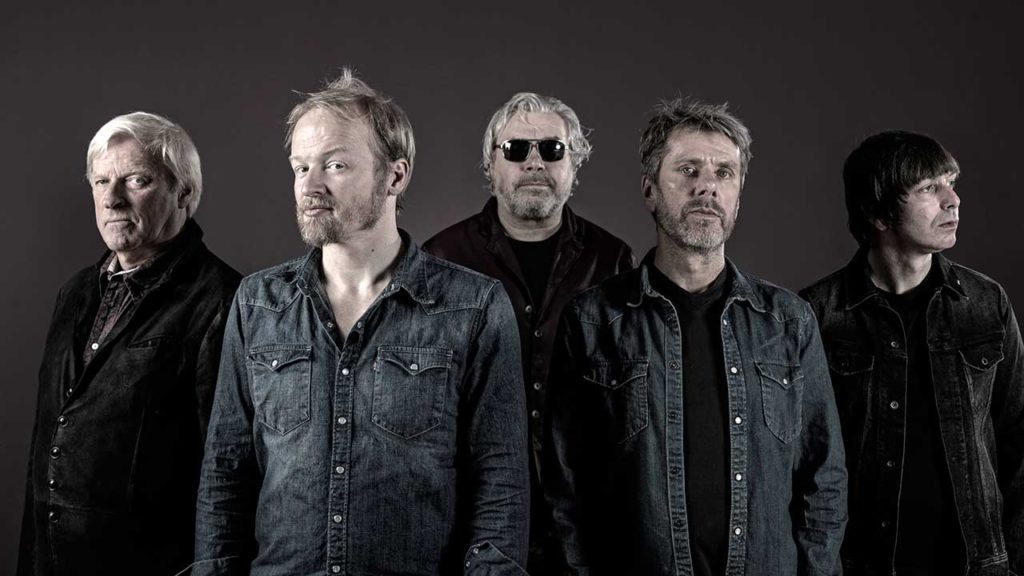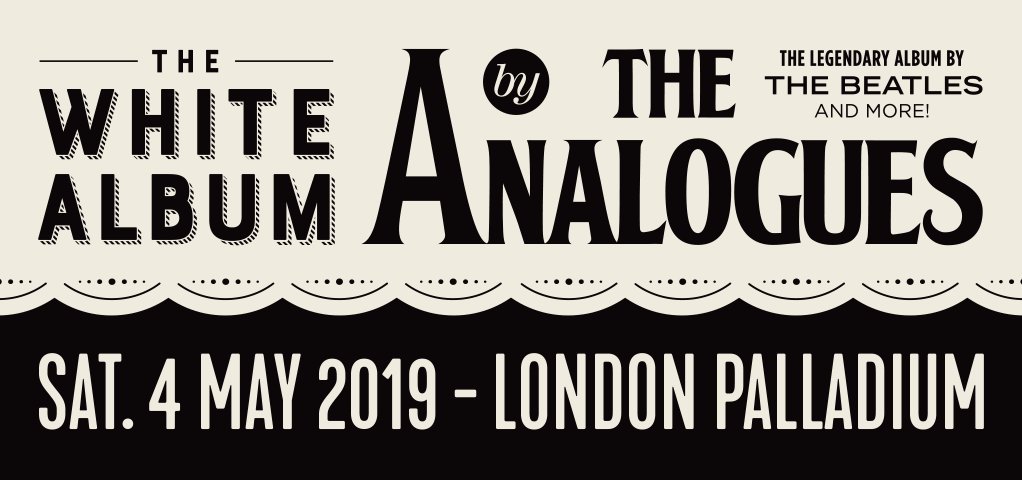On May 4th at London’s Palladium, The Analogues recreate The White Album – playing the 30-track LP from the first to very last note. Jason Barnard talks to Diederik Nomden (keys, guitar, vocals – far left) and Fred Gehring (drums, vocals – second left) from the Dutch fab five about the highly anticipated show and their on-going quest to faithfully capture The Beatles sound live. 
The Analogues
It must be great to play The London Palladium, given strong The Beatles connection it has. Have you played any other venues where The Beatles have previously played live?
Fred: Coincidentally, we just played Munich’s “Circus Krone” last Friday, April 14th. It’s an iconic 100-year-old actual circus theatre that still features circus productions and all kinds of live musical performances. The Beatles played there on June 24th 1966 on tour, two months later after their San Francisco Candlestick Park show they announced the end of their live performances. It’s hard to say why, but both us and the audience did feel their ‘presence’ in the venue last Friday. Magic. I imagine Palladium will have that vibe as well.
Given the range of material on The White Album (from the acoustic Julia to avant-garde Revolution No. 9) would you say it’s more difficult to recreate than Sgt Pepper?
Diederik: It was certainly more difficult to get the correct ‘flow’ in this show, as the album has a lot of instrument changes and a lot of the songs on the record follow each other up without pauses. On top of that, there’s less ‘orchestral instrumentation’ to hide behind, so I’d say it was more difficult than Sgt Pepper’s.
There’s been different opinions among The Beatles camp on The White Album – should it have been two separate single album, just one single record or as released – why?
Fred: For a moment, we explored the idea of performing a ‘single album’ version to figure a way out of having to deal with Revolution #9 live… But if you give yourself the obligation to select 15 out of 30 songs you quickly find that it is impossible, there are simply way too many amazing songs on the album. Yes I’m sure everyone will be able to name a few they could have lived without but that doesn’t make the case for a single album. In addition, it was released like this and existed like it for 50 years, don’t mess with it, at least that’s our thinking. So, we went for it and we perform the album in its entirety.
What instruments do you use and how do they compare to the originals?
Fred: On every album we work on, we try and find the real thing. In some instances that means meaningful investments (like the Mellotron) but for others, it comes down to a fanatic search for the absolutely correct sound coming from what otherwise isn’t per se a museum piece (like the maritime bell for ‘Everybody’s Got Something to Hide Except Me and My Monkey’ which didn’t cost much, but was very hard to find). The guitars are a special category, mostly we try to find vintage guitars, sometimes we use re-issues until such time that we find the one we want. Often when a particular guitar is from a period close to when the Beatles played, the value gets insanely inflated. So, we chose to wait until we find something reasonable. But in the meantime, the museum is pretty complete.
To what lengths have you gone to get the right equipment?
Fred: It’s an ongoing patient process. Sometimes with stepped up intensity because we HAVE to have something but mostly, we scout the world continuously thanks to that wonderful invention of Ebay.
The Beatles could not create their later material live using vintage equipment – do you augment it with recordings/samples?
Diederik: We use all hands available, as we have to recreate every single bit that was recorded. All claps, tambourines, extra keyboards etc. But sometimes, for example with ‘Goodnight’, we have to augment with extra parts that our orchestra previously played in the studio, simply because we can’t take 40+ people on stage, and sometimes you just need them!
How does The Beatles status in the Netherlands compare with the UK or US?
Fred: The Dutch passion for the Beatles is the same as many other countries around the world, perhaps not the way it is in the UK, as it’s their home town. However, we play to incredibly captive audiences who seem to love the music deeply and then specifically the later albums that they played so often in their lives but never really got to experience live. That said, we see the same in Belgium and Germany, and for what it’s worth, Liverpool topped it all!
When did you form and get the idea to perform Beatles tracks?
Fred: We talked about it for a few years, but we actually formed the band almost five years ago. As much as we all like the earlier Beatles songs, our main passion and the essence of the band is about everything after Revolver, the albums they recorded in the studio but didn’t ever perform live. Between 1966 and 1969 in just about three short years all of 5 albums, one which double, plus some incredible singles. These were outrageously successful around the world, but again, never performed live. It had to be done in a way we believe they might have sounded, had they actually done it, hence the vintage gear and the live orchestral support. This continues to be our mission.
You seem to solely focus on music rather than dressing up as the Fab Four. Was that always the intention?
Fred: It was always about the sound and the feeling, not the looks. Also, we are five instead of four so what should the fifth Beatle look like? They were in their early 20’s, and all those bands you see trying to achieve the visual impact – well, let’s say they are clearly not in their 20’s…
Over the years you’ve received praise from people like Geoff Emerick and Tony Crane who knew and worked with The Beatles. That must be hugely gratifying – what does that mean to you?
Fred: The overall response from the audiences including some very fanatic (and educated) fans, has been amazing and a great concert review from a respected music critic is always very nice as well but the ‘nod’ from true insiders tops it all, that’s what made Liverpool so special. There were many connoisseurs including insiders who were there, and their sincere compliments were overwhelming. Geoff Emerick’s compliments were almost surreal, he came to our Sgt Pepper show on June 1st 2017 and ended up staying a week with us. We were devastated when we heard that he so suddenly passed away.
Is there anything you’ve learnt, or thought about The Beatles material across the album’s you’ve recreated, that you wouldn’t have known otherwise?
Diederik: Thanks to this project, we’ve had to dive even deeper into the material, and all discovered new parts, little details, hidden gems and funny stuff in the recordings that we (even as hardcore Beatle-freaks) overheard until we began recreating the full albums.
I understand that your live albums are released under the Decca label which is fantastically ironic. Was that the band’s idea? Which of those records/shows are you most satisfied with and why?
Fred: We were approached by Universal to release the live recordings. Honestly, we were wondering who would buy a live recording that is intended to match the original studio recording so closely, you could hardly here the difference… but they were right, many people do buy the records. Hearing it live is still a very different feeling than listening to a studio recording and they can’t compare it to the Beatles live. It got better when Universal suggested to do it all on the Decca label which they own but as you say, “fantastically ironic” and something that quite a few people recognise.
I’ve read that you are planning on recreating Abbey Road in future, is that The Analogues next big project?
Diederik: Yup, we’ll perform it in Antwerpen on its actual 50th anniversary, 26 September, and in the Paris Olympia the night after. Then, on October 5th, we’ll premiere it in The Netherlands in Ziggo Dome Amsterdam. In the first months of 2020 we’ll be playing all over The Netherlands with the show, especially adapted for theatres.
The Analogues play The White Album at London’s Palladium on May 4th. Tickets are on sale now.
Further information can be found on The Analogues website.

